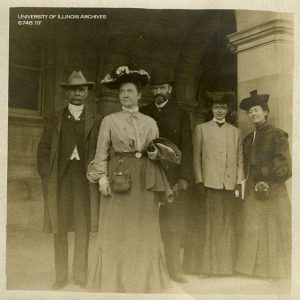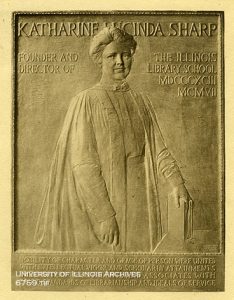
For an educated woman at the turn of the century, there were few options for a intellectually satisfying career, as Katharine L. Sharp discovered as a newly minted college graduate in 1885. She taught foreign languages at a high school in Illinois for two years, but then she took a position as Assistant Librarian at the Scoville Institute and seems to have found her calling. Believing so strongly in the burgeoning field of professional librarianship, she enrolled in the new New York State Library School in 1889, where she studied under Melvil Dewey. [1]
Dewey was very impressed by her work, so much that when Frank W. Gunsaulus came to ask him to recommend who he thought was the “best man” to start up a library program at the Armour Institute in Chicago, Dewey proclaimed “The best man in America is a woman,” and recommended Katharine L. Sharp for the position. [2]
The papers of Katharine L. Sharp hold further evidence of Melvil Dewey’s high regard for her work. In one letter he says to her:
I am greatly pleased at your prosperity and the fact that the Armour is so much of a center for the Library school people. I am specially pleased that you are to have charge of the summer library work at the University of Wisconsin. That is the best place for it in the northwest and you are the best one to manage it. I should have been sorry to have it put in the hands of some librarian with no experience either in the Library school or in teaching. [3]
Sharp managed the Armour Institute Library School from 1893 to 1897, when the president of the University of Illinois offered her a new home for her library program, along with the opportunity to take it from a vocational certificate to a full bachelor’s degree. The offer also came with the position of director of the university’s library. Katharine Sharp accepted the offer, officially starting the University of Illinois’s library school in 1897, which would go on to become the top ranked library school in the nation.
Other than their documentation of the life and work of Katharine Sharp, an amazing secondary value provided by these records is the insight they give into the motivations behind why women chose to enter the very new field of professional librarianship, as many people wrote seeking information on librarianship and provided specifics of their situations. One letter from a pastor writing on behalf of his sister says “My sister feels that she must earn her own living and desires to fit herself for some kind of work by which she may be able to do so,” which hints at a woman seeking independence [4]. He also asks pointedly if there is “enough demand for lady librarians,” reflecting the discrimination women faced in finding employment at the time. Another letter documents a different reason for women joining the workforce: a person writing on behalf of “a young woman who sometime ago left our school has been obliged through particularly sad fortune to earn her own living,” asks about any available scholarships and loans, giving more indication of entering librarianship through desperation [5].
Katharine Sharp’s career ended of her own choice in 1907, when she was only 42. In her resignation letter given to her senior students, she said,
I have felt for some time that the pressure of administrative duties was preventing me from doing what I wished to do for the school. I have felt still more that it was crushing the human element out of my life. [6]

Considering how hard she worked doing two jobs at the University as well as a large amount of professional organizational work with the Illinois Library Association and the American Library Association, it is no small wonder she felt crushed. After her retirement she lived and worked at Lake Placid Club with her friend and mentor Melvil Dewey until her sudden death in 1914.
Perhaps more touching than the regard of Melvil Dewey was the outpouring of appreciation and affection from her former students when they learned of her untimely death, which are recorded in the correspondence files for her memorial fund. One letter, from a former student donating money for Katharine Sharp’s memorial, states:
The little contribution which I am able to make expresses very inadequately my admiration for one of the most remarkable women I have ever known. Not only do I feel a debt of gratitude to the founder of the Library School, but also to you [Frances Simpson, Assistant Director of the Library School] and other members of the Library School faculty for the help and encouragement which you gave me in starting out in an occupation which has proved so congenial. [7]
A wide variety of material related to Katharine Sharp’s work as Director of both the Library School and the University Library is available for use at the University of Illinois Archives, including Record Series 18/1/1, 18/1/20, 18/1/22, 35/1/1, 35/1/16, and 35/2/13. There is also a class notebook from one of her students available, RS 41/30/6. All the letters mentioned in this blog post have been digitized and made available online.
Sources:
[1] From Dictionary of American Library Biography edited by Bohdan S. Wynar. Libraries Unlimited, Inc., 1978.
[2] Ibid.
[3] Letter from Melvil Dewey to Katharine Sharp, March 26, 1895. Katharine L. Sharp Papers, Record Series 18/1/20, Box 1, Folder “Correspondence – D.”
[4] Letter from P. H. Mason to the Armour Institute, September 16, 1895. Katharine L. Sharp Papers, Record Series 18/1/20, Box 1, Folder “Correspondence – C.”
[5] Letter from Miss Caroline E. Cooper to Armour Institute, c. October 15 1896. Katharine L. Sharp Papers, Record Series 18/1/20, Box 1, Folder “Correspondence – C.”
[6] Copy of Katharine L. Sharp’s resignation letter donated by a former student, dated April 29, 1907. Katharine L. Sharp Papers, Record Series, Box 5, Folder “Resignation – copy of letter.”
[7] Letter from Mary P. Billingsley of the Kansas City, MO Library to Frances Simpson, Assistant Director of the Library School, October 15, 1915. Katharine L. Sharp Memorial Correspondence, Record Series 18/1/22, Box 1, Folder “General correspondence about Sharp Memorial A-Z 1914-22.”